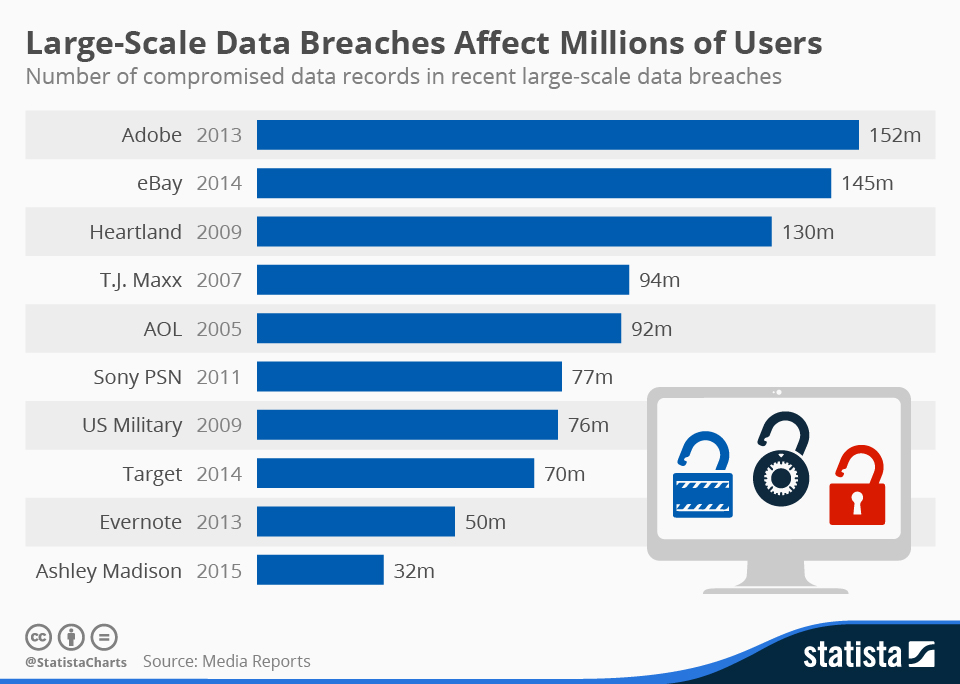T-Mobile's $16 Million Fine: Three Years Of Data Breaches

Table of Contents
The Timeline of T-Mobile Data Breaches
T-Mobile's struggle with data security wasn't a single incident; it was a series of breaches spanning several years, culminating in the substantial FCC fine. Understanding the chronology is key to grasping the severity of the situation and the systemic issues at play.
2021 Breach: A Wake-Up Call
The 2021 T-Mobile data breach exposed the personal information of millions of customers. This massive data breach involved the compromise of sensitive data, including names, addresses, Social Security numbers, driver's license information, and financial details. The sheer scale of the breach caused significant alarm and prompted immediate investigation.
- Impact on Customers: The consequences for affected customers were severe. Many faced increased risks of identity theft, fraudulent activities, and financial losses. The emotional toll and time spent rectifying the damage were also considerable.
- T-Mobile's Initial Response: While T-Mobile offered credit monitoring services, criticisms arose regarding the company's initial response, with some arguing that it was slow and insufficient to address the extent of the breach and protect its customer base. The lack of proactive security measures before the breach was a major point of contention.
2022 Breaches: A Pattern of Failure
Unfortunately, the 2021 breach wasn't an isolated incident. Throughout 2022, T-Mobile experienced further, albeit smaller, data breaches. These subsequent incidents demonstrated a concerning pattern of vulnerability within the company's cybersecurity infrastructure. Although the number of affected customers varied, the recurring nature of these breaches raised serious concerns about the effectiveness of T-Mobile's security protocols and their ability to prevent further attacks.
- Data Compromised: While the specifics varied slightly between incidents, these breaches continued to compromise sensitive customer data, reiterating the need for more comprehensive security measures.
- Lack of Improvement: The continued occurrence of breaches after 2021 highlighted a critical failure to implement effective preventative measures following the initial major data security incident. This repeated vulnerability underscored the need for substantial improvements in T-Mobile's cybersecurity strategy.
Cumulative Impact: Eroding Trust and Reputation
The cumulative impact of these T-Mobile data breaches over three years has been significant. The company's reputation suffered considerable damage, eroding customer trust and potentially impacting its financial performance.
- Customer Churn: While precise figures aren't publicly available, it's highly probable that the series of breaches led to a measurable increase in customer churn, as individuals switched providers due to concerns over data security.
- Financial Repercussions: Beyond the $16 million fine, the long-term financial costs related to legal fees, remediation efforts, and damage to brand reputation are likely far greater.
The FCC's Investigation and the $16 Million Fine
The Federal Communications Commission (FCC) launched a thorough investigation into T-Mobile's repeated data breaches. Their findings led directly to the hefty $16 million fine.
The Investigation Process: Uncovering Systemic Failures
The FCC's investigation involved a detailed examination of T-Mobile's security practices and procedures. They assessed the company's compliance with relevant regulations, the effectiveness of its security protocols, and its response to the breaches.
- Legal Framework: The investigation relied on existing regulations related to data security and consumer protection. The FCC scrutinized T-Mobile's compliance with these rules and regulations, evaluating the company's adherence to best practices.
- Evidence Presented: The FCC's decision was based on substantial evidence detailing the severity of the breaches, the inadequate security measures in place, and the company's response or lack thereof.
The Reasons Behind the Fine: Severity and Neglect
The $16 million fine reflects the seriousness of T-Mobile's repeated failures to protect customer data. The FCC deemed the breaches to be severe violations of regulations, citing the massive amount of sensitive information exposed and the potential for significant harm to consumers.
- Regulatory Violations: The FCC specifically highlighted T-Mobile's violation of specific regulations designed to protect customer data. These violations included failures in implementing appropriate security measures and failing to properly respond to and mitigate the impact of the breaches.
- Consumer Harm: The potential for identity theft, financial fraud, and other forms of consumer harm resulting from the breaches formed a significant part of the FCC's rationale for imposing such a substantial fine.
Industry Implications: A Call for Stronger Security
The T-Mobile case sets a significant precedent for the telecommunications industry, underscoring the increasing regulatory scrutiny of data security practices. It serves as a stark warning to other companies about the potentially devastating consequences of neglecting cybersecurity.
- Increased Scrutiny: The FCC's action is expected to increase regulatory oversight and enforcement of data security regulations within the telecommunications sector.
- Industry-wide Impact: The fine and the public attention drawn to T-Mobile's failings have prompted other companies in the industry to reassess their own security protocols and bolster their defenses against potential cyberattacks.
Lessons Learned and Future Implications for Data Security
The T-Mobile data breaches offer valuable lessons for organizations of all sizes regarding the importance of proactive and robust data security measures.
Best Practices for Data Protection: Proactive Measures are Key
Protecting customer data requires a multi-faceted approach encompassing both preventative measures and well-defined incident response plans.
- Multi-Factor Authentication: Implementing robust multi-factor authentication significantly reduces the risk of unauthorized access.
- Data Encryption: Encrypting sensitive data both in transit and at rest is crucial in minimizing the impact of potential breaches.
- Regular Security Audits: Regular security audits and penetration testing can identify vulnerabilities before they can be exploited.
- Employee Training: Training employees on cybersecurity best practices and phishing awareness is also critical.
The Importance of Proactive Security Measures: Prevention is Better Than Cure
Investing in robust security infrastructure upfront is far more cost-effective than dealing with the repercussions of a data breach. The T-Mobile case demonstrates this starkly.
- Cost-Benefit Analysis: A thorough cost-benefit analysis should compare the cost of implementing strong security measures with the potential costs of a data breach, including fines, legal fees, reputational damage, and loss of customer trust.
- Long-term Strategy: Data security should be viewed as a long-term, ongoing investment, not a one-time expense.
Consumer Awareness and Rights: Protecting Yourself
Consumers need to be aware of their rights and take proactive steps to protect themselves from data breaches.
- Monitor Credit Reports: Regularly checking credit reports for suspicious activity can help detect identity theft early.
- Strong Passwords: Using strong, unique passwords for all online accounts is essential.
- Fraud Alerts: Setting up fraud alerts with credit bureaus can provide early warning of potentially fraudulent activity.
Conclusion
T-Mobile's $16 million fine for three years of data breaches serves as a stark reminder of the high cost of inadequate data security. The timeline of breaches, the FCC's investigation, and the resulting penalty highlight the critical need for proactive security measures and robust incident response plans. Understanding the gravity of the T-Mobile data breach, and its $16 million price tag, should prompt both companies and consumers to prioritize robust data security measures to prevent future incidents. Learn more about protecting your data by visiting [link to relevant resource on data security].

Featured Posts
-
 The Silent Divorce Identifying The Unmistakable Signs
Apr 28, 2025
The Silent Divorce Identifying The Unmistakable Signs
Apr 28, 2025 -
 Unlocking Podcast Potential Ais Role In Transforming Repetitive Scatological Documents
Apr 28, 2025
Unlocking Podcast Potential Ais Role In Transforming Repetitive Scatological Documents
Apr 28, 2025 -
 2025 New York Yankees Gear Where To Find Hats Jerseys And More
Apr 28, 2025
2025 New York Yankees Gear Where To Find Hats Jerseys And More
Apr 28, 2025 -
 Starbucks And Its Union At Odds Over Proposed Wage Hikes
Apr 28, 2025
Starbucks And Its Union At Odds Over Proposed Wage Hikes
Apr 28, 2025 -
 Abu Dhabi Pass 10 Gb Sim Card And 15 Discount On Activities
Apr 28, 2025
Abu Dhabi Pass 10 Gb Sim Card And 15 Discount On Activities
Apr 28, 2025
